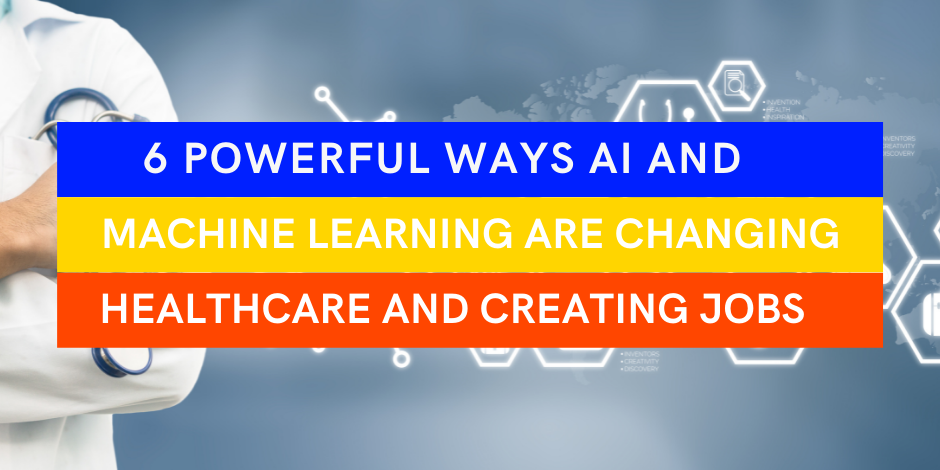6 powerful ways machine learning and AI are changing the healthcare industry and creating jobs

Stay Informed With Our Weekly Newsletter
Receive crucial updates on the ever-evolving landscape of technology and innovation.
Machine learning and AI are changing healthcare in a miraculous way, creating jobs and saving lives. It is really incredible that the future of healthcare will be revolutionized by data science. The combination of artificial intelligence with human intelligence will transform the way we work for the better.
There is a strong career outlook for healthcare data scientists. Here are 6 ways that machine learning and AI are changing healthcare and creating jobs:
1. Machine learning is revolutionizing medical imaging and diagnostics
Machine learning has made tremendous advancements in medical imaging and diagnostics by providing more accurate and detailed results, improving patient outcomes.
Machine learning models can identify subtle abnormalities in medical imaging that the human eye would be unable to detect. Machine learning has been able to detect cancerous tumors on mammograms and MRI scans without the patient needing to perform a biopsy. This is a massive breakthrough for healthcare!
Even the most qualified radiologists are subject to human error but machine learning algorithms are already proving to display high quality, early detections and the ability to compare interpretations of the results. Radiologists can now focus on more pressing tasks to produce quality work. Machine learning is revolutionizing the medical imaging industry and needs data scientists to continue working on the algorithms.
2. Big data is improving clinical performance
Electronic health records (EHRs) are overflowing with disorganized data making clinical staff struggle to serve patients. Electronic health records need to be able to provide accurate information at the right time which is where a deep learning algorithm can tailor the perfect solution based on each individual patient’s needs.
The application of deep learning algorithms is reshaping healthcare databases in order to better service patients. Physicians can now access data that allows them to prescribe the most effective treatment to patients. Google’s DeepMind Health model uses big data to deliver more substantial treatment. Google has a strong investment in healthcare analytics and is actively searching for skilled data scientists.
Big data will be a key tool to improving clinical performance and providing the highest quality of healthcare to the community. In order to accomplish this, big data needs to be combined with predictive analytics in order to provide medical practitioners with the best course of action to deliver treatment and provide effective patient care.
3. AI is changing genomics and genetic engineering
AI is changing genomics and genetic engineering in a number of exciting ways. A person’s unique genetic makeup can be studied in order to develop a customized treatment for them.
The industry can implement new genetic data models in a more suitable form to provide the correct results when needed. AI systems allow for DNA sequencing and analysis to take place faster in order to determine how to better treat patients.
Google is creating jobs for AI practitioners to work on their model called DeepVariant to interpret high-throughput sequencing into a high-quality image of a genome. Genome sequencing previously took a decade to generate results but now with high-throughput sequencing, it takes one day.
4. Deep learning is reshaping robotic-assisted surgical operations
Deep learning is a strand of machine learning based on algorithms that learn by association – the more data processed, the more accurate the result is. Deep learning is reshaping robotic-assisted surgical operations by developing their functions to more accurately aid surgeries.
Robotics have been in hospitals for over 30 years ranging from assisting surgical operations to performing the surgery themselves. The Da Vinci system has already successfully demonstrated the potential of artificial intelligence technology in hospital’s operating rooms.
Surgeons can use AI devices similar to Alexa or Siri to counsel doctors on specific information that will guide them in managing unexpected medical complications and making better clinical decisions. This device is a tool to access existing research without the surgeon needing to deliberate over the best medical procedure to perform.
5. Data analytics is transforming the pharmaceutical industry
Data analytics is transforming the pharmaceutical industry rapidly with insights on drug discovery and precision medicine. Data analytics has the potential to transform drug development, innovate and assist researchers with discovering breakthroughs.
Machine learning is reshaping the way drugs are designed and produced. Deep learning algorithms can scan through prescription patterns to analyze trends in substance abuse and overdose.
The pharmaceutical industry is strongly investing in machine learning because it is reducing costs associated with marketing new drugs. The career prospects within the pharmaceutical industry are vast because companies are wanting to stay ahead of their competition.
6. Data science is reducing healthcare costs
Data science is reducing the high healthcare costs by having machines generate information rather than humans. Many healthcare companies are in a rush to tackle the overwhelming amount of healthcare costs headed their way. Machine learning solutions can assist with managing those costs and ensure healthcare providers and insurance companies are paid correctly.
Healthcare apps and wristbands help us monitor and prevent health problems avoiding trips to the doctor. These tools provide consumers with the autonomy to take responsibility for their wellbeing, discover early detections as well as reduce costs to access medical treatment.
Data science is also changing healthcare training and reshaping how procedures are taught to medical practitioners. Similar to the AI devices previously mentioned to assist surgeons, there is significant potential for the same devices to provide extensive research and training to staff much quicker than a human.
Studies show that humans and computers perform at their best when they are working together as opposed to humans alone or computers alone. This is further evidence that machine learning and AI are creating jobs and changing healthcare for the better.
If you are interested in developing your data science skills, book a consultation with a career consultant now.

